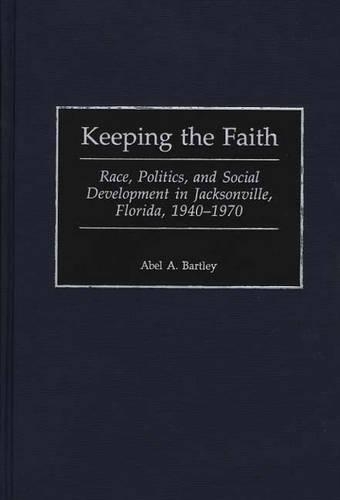
Keeping the Faith: Race, Politics, and Social Development in Jacksonville, Florida, 1940-1970
(Hardback)
Publishing Details
Keeping the Faith: Race, Politics, and Social Development in Jacksonville, Florida, 1940-1970
By (Author) Abel A. Bartley
Bloomsbury Publishing PLC
Praeger Publishers Inc
30th April 2000
United States
Classifications
Tertiary Education
Non Fiction
Ethnic studies / Ethnicity
Social discrimination and social justice
Regional, state and other local government
History of the Americas
Racism and racial discrimination / Anti-racism
305.896073
Physical Properties
Hardback
208
Width 156mm, Height 235mm
425g
Description
An examination of the political and economic power of a large African American community in a segregated southern city; this study attacks the myth that blacks were passive victims of the southern Jim Crow system and reveals instead that in Jacksonville, Florida, blacks used political and economic pressure to improve their situation and force politicians to make moderate adjustments in the Jim Crow system. Bartley tells the compelling story of how African Americans first gained, then lost, then regained political representation in Jacksonville. Between the end of the Civil War and the consolidation of city and county government in 1967, the political struggle was buffeted by the ongoing effort to build an economically viable African American economy in the virulently racist South. It was the institutional complexity of the African American community that ultimately made the protest efforts viable. Black leaders relied on the institutions created during Reconstruction to buttress their social agitation. Black churches, schools, fraternal organizations, and businesses underpinned the civil rights activities of community leaders by supplying the people and the evidence of abuse that inflamed the passions of ordinary people. The sixty-year struggle to break down the door blocking political power serves as an intriguing backdrop to community development efforts. Jacksonville's African American community never accepted their second-class status. From the beginning of their subjugation, they fought to remedy the situation by continuing to vote and run for offices while they developed their economic and social institutions.
Reviews
.,."fills a void in the history of race relations in one of Florida's largest cities before and during the civil rights movement. This volume should be read by those interested in the Civil Rights movement, in Southern and Florida History, and in African American History."-Florida Historical Quarterly
.,."fills in some important gaps in the field...elucidates further the variety of ways in which the modern struggle for black equality played out across the urban South....provides an important example of New South racial conservatism."-The Journal of American History
...fills a void in the history of race relations in one of Florida's largest cities before and during the civil rights movement. This volume should be read by those interested in the Civil Rights movement, in Southern and Florida History, and in African American History.-Florida Historical Quarterly
...fills in some important gaps in the field...elucidates further the variety of ways in which the modern struggle for black equality played out across the urban South....provides an important example of New South racial conservatism.-The Journal of American History
..."fills in some important gaps in the field...elucidates further the variety of ways in which the modern struggle for black equality played out across the urban South....provides an important example of New South racial conservatism."-The Journal of American History
..."fills a void in the history of race relations in one of Florida's largest cities before and during the civil rights movement. This volume should be read by those interested in the Civil Rights movement, in Southern and Florida History, and in African American History."-Florida Historical Quarterly
Author Bio
ABEL A. BARTLEY is professor of African American and Urban History at the University of Akron./e He is a specialist on southern African American political activism, and he has authored several articles on urban and African American historical topics.
